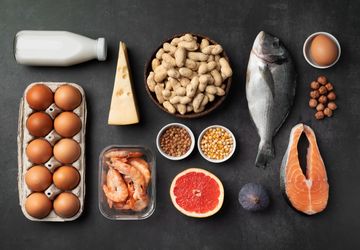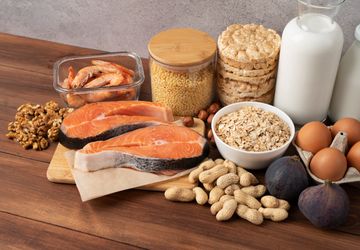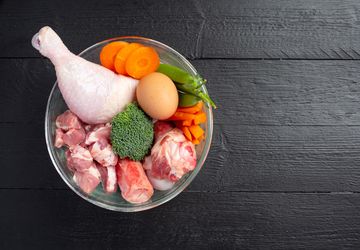A diet rich in nitrogenous matter is generally suggested for shedding some pounds because of its ability to improve satiety, boost metabolism, and assist muscle development and repair. Nitrogenous-rich meals can help you not crave for food for a good amount of time, lower desires, and aid in shedding pounds. In this post, we will look at the top ten high-nitrogenous meals that might help you feel satiated while shedpding pounds. Let's get started!
1. Eggs

Eggs are a high-quality nitrogenous source that contains all the necessary amino acids. They are also high in micronutrients and can aid with appetite regulation and sugar restriction throughout the day.
2. Chicken Breast
Chicken breast is a good nitrogenous source that is moderate in fat yet packed in nitrogenous matter. It contains amino acids that are essential and is flexible enough to be used in a wide range of cuisines.
3. Greek Yoghurt
This kind of yoghurt which is compact with concentrated nitrogenous matter is used to enhance the process of digestion. It is a flexible dish that may be eaten as a snack, blended with fruits and vegetables, or used as the foundation for stews and dressings.
4. Quinoa Salad
Quinoa is a full-nitrogen source, which means it includes all of the necessary acids. It is also high in roughage, which improves digestion and keeps you feeling satisfied.
5. Lentils

Lentils are a high-roughage, low-fat, plant-based nitrogen source. They are high in nitrogenous matter and may be used in soups, salads, or stews for a satisfying and healthy meal.
6. Dutch Cheese
Cottage cheese is a high-nitrogenous, low-fat dairy product. It's also high in calcium and may be eaten as a snack or mixed into meals to boost nitrogen content.
7. Salmon
Salmon is not only high in nitrogen, but it also contains essential fatty acids, which have several health advantages. It is a nutrient-dense meal that aids in shedding pounds and general health.
8. Edamame
Edamame, or young soybeans, is a plant-based nitrogen source high in roughage and antioxidants. It may be eaten as a side dish or added to salads and stir-fries to increase nitrogen content.
9. Almonds
Almonds are a delicious food items that contains both nitrogenous compounds and a good amount of saturated fats. They are also high in roughage and can aid with appetite control and reduce sugar content.
10. Tofu
It is a versatile nitrogenous matter that is frequently used as a side and as in vegan foods. It has a low sugar count, and a high nitrogen content and can be cooked in a variety of ways to add flavor and texture to dishes.
Why You Should Choose Protein-Rich Foods?
Nitrogen-rich meals are essential for a balanced diet and for supporting many biological processes. Whether you want to shed some pounds, gain muscle, or simply enhance your overall health, integrating nitrogenous foods into your diet can help. Here are several convincing reasons to consume such foods:
● Satiety and Weight Management
Nitrogen is well-known for promoting feelings of contentment and satiety. Including such foods in your meals can help prevent snacking between meals and, as a result, aid to weight management. Nitrogen takes longer to digest than carbs, allowing you to feel satisfied for extended periods of time and reducing overeating.
● Muscle Building and Repair
Nitrogen is the building block of muscles and is essential for the maintenance of muscles. Exercise and strength training enhance the development of healthy muscle mass and aid in the regeneration of injured muscle tissues. By consuming adequate nitrogen, you can enhance your body's ability to recover from exercise and achieve better fitness results.
● Increased Metabolism

Compared to carbs and lipids, nitrogenous stuff has a stronger thermic impact, which means it takes greater amounts of energy to break down and metabolise. This results in a temporary increase in your metabolism, known as the thermic effect of food. You can increase the rate at which you burn calories and perhaps burn more sugar throughout the day by include such foods in your diet.
● Stabilize Blood Sugar Levels
Nitrogen-rich diets can help maintain blood glucose levels and inhibit unexpected energy spikes and crashes. Nitrogen, when ingested with carbs, inhibits the absorption of glucose into the circulation, resulting in a more steady release of energy. This can assist in avoiding energy slumps and maintain consistent energy levels throughout the day.
● Rich Source of Essential Minerals
Nitrogen-rich diets are frequently high in other critical elements such as vitamins, essential minerals, and healthy saturated fats. Nitrogenous foods such as lean meats, salmon, and nuts provide a wide spectrum of nutrients required for good health. These meals contain not only protein but also vital micronutrients that help with a variety of biological processes.
● Promotion of Bone Health
Nitrogen is important in both the maintenance and promotion of bone health. It aids in the formation of collagen, which gives bones shape and strength. Nitrogenous diets, particularly those high in amino acids like lysine and arginine, can help to maintain bone density and lower the risk of age-related bone loss. Those who are suffering from bone disorders should incorporate nitrogenous foods into their diet.
● Immune Function
Nitrogen is required for a functioning immune system. It aids in the production of immunoglobulins amino acids, and other immune-related elements that protect the body from illnesses and infections. You can support your immune system and improve its ability to protect against infections by eating enough nitrogenous foods. A proper amount of nitrogen and other minerals is essential to maintain a sustained lifestyle.
Conclusion
When it comes to shedding some pounds, incorporating high-nitrogen foods into your diet might be a game changer. Eggs, chicken breast, quinoa, lentils, cottage cheese, salmon, Greek yogurt, lentils, edamame, almonds, and tofu are among the top ten high-nitrogen foods since they include not just nitrogen but also a variety of other necessary elements. You may feel satisfied for longer, minimize cravings, and support your shedding pounds objectives by including these items in your meals. To identify the optimal nutritional plan for your specific requirements and objectives, contact a healthcare practitioner or registered dietitian.
